- Home
- Karen Traviss
The Best of Us Page 17
The Best of Us Read online
Page 17
“Director, you’re on.” Berman stood at the open office door. “I brought the buggy to save you the walk. Tends to build tension if you’ve got a long time to think about it.”
She tried to give him a withering glance. “Do I look tense?”
“This was never going to be easy.”
“Did you ever consider becoming a motivational speaker, Phil?” She slid onto the buggy’s narrow bench seat. “It’s probably not your calling.”
The conference hall was full. It wasn’t hard to draw a crowd here for any kind of talk when so little happened, but she hadn’t given an address in years, and never one arranged at the last minute and flagged as urgent. She walked up to the podium and burned a few moments rearranging her notes and stylus, reminding herself where the screen controls were while she scanned the audience.
Trinder and Fonseca were sitting together on the right-hand side near the front, surrounded by most of the detachment. Trinder’s arms were folded tight across his chest, his gaze fixed on the wall-sized screen behind Erskine. He’d obviously worked out that he hadn’t been given the chance to brief his people as promised and he seemed to be avoiding eye contact. But then he unfolded his arms and looked right at her, unblinking, and she knew that their working relationship had taken a turn for the worse. She’d never had to ask him to trust her. Now she suspected she never could. She looked away and swallowed to clear her throat.
“Thank you all for coming this afternoon,” she said.
The general murmur stopped dead and the stage lighting suddenly seemed harsh and pitiless, interrogation-style. Erskine carried on.
“What I’m about to tell you is good news. But it’ll shock you, and it might make you angry. You’re bound to have a lot of questions, too, but I might not have answers to all of them yet.” Here we go. She paused to gauge the mood as best she could and saw a mix of blank and baffled expressions. “It started with a lie that’s now changed human history. For years, we’ve told you — told the world — that the Cabot mission was lost with all hands. But that’s a cover story we maintained to prevent the mission from being compromised by hostile governments and international agencies. The ship was never lost. It’s now nearing its destination, Pascoe’s Star, and the crew’s due to be woken from cryo very soon. The mission, code-named Nomad, is on schedule, and we’ve got real-time video to show you, live from the base.”
She paused and looked around the audience. It hadn’t sunk in. She tried again.
“Yes. You heard correctly. We have a real-time link, because we developed FTL technology after Cabot was launched. We’ve been constructing the habitat in the meantime using remotely managed bots.” She waited again, but the hubbub she expected still didn’t materialise. “Come on, people. Don’t we even get a gasp for the FTL?”
Somebody began clapping, but very weakly. This was too much for even five-star intellects to digest all at once. Erskine looked around, spotted Fonseca staring accusingly at Trinder, and Trinder apparently trying not to look at her. It was easy to add a caption that would be repeated across the company as staff realised that their department heads had known this all along: “Why didn’t you tell us?”
Erskine ploughed on. “So... let me show you the live feed from Opis, Pascoe b, which some of you might recall is a warm Terran-type exoplanet. Here it is.”
She touched the control on the lectern and the big screen came alive. There was the camp, a cluster of buildings bathed in floodlights, the bot tracks crisscrossing the ground now thrown into sharp relief. That did it. Now she heard the murmurs and the collective intake of breath.
“Ladies and gentlemen, welcome to the core of humanity’s first permanent colony in deep space. It’s all ready for Cabot’s crew to move in. And we have extraordinary times ahead. I’m sorry that so few of you were told, and that included me at one time, but we have good reason for extreme security.”
Nobody reacted. Nobody fidgeted or whispered, not for a few seconds.
Then the real applause broke out, sporadically at first, then rippling around the room until most of the auditorium joined in with varying degrees of enthusiasm. Some didn’t, though, and sat either staring at the screen or with their heads lowered, talking among themselves.
Erskine risked catching Trinder’s eye again, but he just nodded, got up, and walked out, followed by his troops, no doubt to do some explaining in private.
“Director, shall I hang around to talk people through this?” Solomon asked via the public address system. “In fact, I could transfer to the Nomad quad and walk them through it.”
Erskine was almost relieved that he’d interrupted. “Excellent idea. Ladies and gentlemen, Solomon’s been managing the site for some years via the bots constructed in situ, and he often uploads himself to one of the utility quads to carry out on-site assessments. I suppose we can say that Solomon’s the first person to set foot on an extrasolar planet.”
“I’ll be right back,” Solomon said.
A little muttering started up. One of the botanists raised a hand. “I have questions, Director. This is a stunning achievement, but I see a lot of gaping holes.”
“Go ahead, David.” She had to face this sooner or later. “By the way, I’m going to circulate the original plan and follow up with a series of Qs and As when you’ve all had time to process this and work out what you want to know. And hear your suggestions, of course. Sorry, David. Do carry on.”
“Okay, are the Cabot crew now settlers, or are they coming back at some time? Are you going to share this information with other countries? Will there be more missions? Who’s going to work on Nomad, or is there another team somewhere we don’t know about? Is this why the orbitals and vessels are being maintained? How does this affect us when we’re mostly working on die-back and resistant crops? And what’s Ainatio’s priority, fixing Earth or starting over?”
Erskine couldn’t help herself. He obviously just wanted to vent but didn’t dare call her a lying bitch to her face. “Would you like an answer to each question, David, or was that just an indication of how out of the loop you feel?” She made a show of getting out her screen to take notes. “And I so hoped you were going to ask me about superluminal propulsion, which is equally historic.”
“Pick one, Director.”
“Okay, there’s no second team you don’t know about. All that’s left of Ainatio is what you see around you. The company effectively consumed itself to focus on Nomad. AIs have done most of the heavy lifting. It should have played out very differently, but nobody foresaw die-back and all the catastrophes that flowed from it. And I’ll be honest with you and admit that I don’t think we’ll manage to stop it in time.”
David, like most of the staff, was well able to think through that last answer. It was better to let everyone work out the implications gradually and develop some enthusiasm than announce that there had to be manned follow-up missions in the near future or else Cabot’s journey would be wasted.
“Oh, wow! Look!” Some of the engineers were getting excited about what they could see on the live feed. When Erskine turned to look, a quadrubot had walked into the frame. It raised a front leg and did a restrained, regal wave at its audience.
“Good evening. I’m now live from Opis.” Solomon could turn in quite a dramatic performance when he wanted to. “I’ll switch to my onboard cam and show you around. I’m sorry that it’s dark at the moment, but I’m sure there’ll be many more opportunities to see the planet in daylight.”
One of the botanists gasped. “Oh my God, what’s that?”
A black shape flapped low across the ground behind Solomon and vanished into the darkness beyond the floodlighting.
“Ah, some of the local wildlife,” he said. “A bird, if the zoologists don’t mind my loose terminology. We didn’t find Opis empty, obviously. It’s got a rich ecology, the atmosphere’s breathable, the climate in this region is generally
temperate, and we can grow crops with a little modification. That’s why Tad Bednarz was determined to take a big gamble to get us here. Let me show you around the camp. You’ll be impressed.”
“Birds,” someone murmured. “Complex life forms. No suits or sealed habitats. Okay, China can have Mars.”
Erskine would face hard questions and even harder decisions when people recovered from the shock, but for the time being, more of them were getting caught up in the wonder of it. The deception, the die-back, and the implications for this remnant of Western civilisation were forgotten, at least for the time being.
“Indeed,” she said. “They can.”
06
We’re not in the business of saving Renoirs and recreating Earth like some kind of theme park. We’ll reproduce what we need to survive, but the rest we’ll forge for ourselves. We’ll produce our own artists and our own Renoirs. History has to be remembered if we’re to learn, but looking back, living for the past and trying to be what we once were, automatically lulls us into believing that our best is behind us and that we can’t be greater.
Georgina Erskine, CEO of Ainatio Industries, explaining the absence of an art repository to Dr Annis Kim
Staff Restaurant,
Ainatio Park Research Centre:
one Day After the Cabot Announcement
If Alex timed it right, he might reach the hot food counter to pick his lunch, grab some silverware, and make it back to a table to eat at least a mouthful before it was cold and congealed. It had already taken him twice as long to walk the corridor between labs 5A and 6A because he’d been ambushed at every office doorway and water cooler with questions, endless questions, very good and perceptive questions, logical questions about every damn hole in the Nomad mission document.
He should have seen this coming, even if Erskine hadn’t, but of course she had. She’d have a good reason for not explaining all this to them. If there was anyone who exemplified the principle of never apologising and never explaining, it was Her Imperial Majesty.
Alex made it five yards from the double doors before he was intercepted by Audrey from Biomed. There was a streak of red finger-paint in her hair, probably applied by her toddler.
“There’s a really big elephant in this room,” she said.
He pointed at the servery. “My lunch is in here, too. Walk with me.”
“We’ve all read the original document.”
“I guessed. Ask away.”
“A lot of detail’s devoted to the follow-up missions. Small gene pool stuff. You need more people to supplement the Cabot crew, and even if those missions launch now, the crew will be old folks with grandchildren by the time the next ship lands.”
“Correct.”
“So fifty years ago we had enough people to choose from, all over the world. But now we’re down to this.” Audrey spread her arms. “Are we going to found an inbred colony of Cabotites, like some kind of Pitcairn Island? Are we shelving the whole colony idea and bringing Cabot home? Are we opening up ticket sales to Asia? What, exactly?”
As long as Audrey was with him, Alex wouldn’t be hassled by anyone else. He assembled his plate of burritos as fast as he could and took his tray over to the far corner of the hall, where nobody could claim they were just passing and decide to join in. Was it time to be brutally honest? Screw it, he’d be caught out in any lies sooner rather than later, and it was easier to manage a mutinous crew if they had fewer reasons to lynch him.
“Well, the report was just for context,” he said, pulling out a chair for her like a gentleman. “It was the intention. Now we have to tailor it to what’s left of our reality. No, we don’t have the global talent pool any more. No, we don’t want Cabot to turn around and come home, because in forty-odd years we can’t possibly know what kind of Earth they’ll be returning to, and as they’re not dumb, that’ll cross their minds as well. And no, I don’t think we say to China or Korea, hey, you go ahead and have this multi-trillion-dollar thing that bled us dry, because we just don’t have the staff to fill the seats.”
Audrey leaned forward on folded arms. “It’s going to be us, isn’t it?”
“What is?”
“We’re the follow-up mission. We’re breeding stock.”
This was the problem with having a smart and sceptical workforce. They mostly thought like Erskine, and even if she hadn’t had the luxury of choice when hiring staff, she’d regarded youth and fertility as qualifications in their own right. Audrey looked angry, face flushed and untidy mousey curls escaping from a hair clip. Alex cut off a chunk of untouched burrito and put it on a side plate for her, working on the premise that distracting an aggressive female with food worked pretty well for saving male spiders.
“Well, we’ve got four ships,” he said. “It’s not as good as fifty vessels and a lot more people, but there’s a seat for everyone.”
“Everyone who wants to go, you mean.”
Alex still wasn’t crazy about the idea himself. “We don’t press-gang. Besides, I bet half the guys here wanted to be astronauts as kids.”
“And lots of others love the idea of space and discovering cool stuff, but they don’t want to live there.”
“Okay, I can understand that.”
“So what happens to the die-back programme if we decide to ship out? Or was it just a handy cover for Nomad activity, engineering crops and all that bullshit?”
“Aude, we could have done Nomad with just AIs and bots. In fact, we did, near as damn it. And we didn’t need to send a manned ship. But that wouldn’t be human colonisation, would it? That’s the whole point of this.”
Audrey seemed to have run out of steam. Her hair deflated to relative tidiness and the colour drained from her cheeks. Alex wondered whether to point out the red finger paint but deferred to cowardice.
“So I’m a brood mare,” she said. “How about the town? Have they been carefully preserved to expand the gene pool too?”
“Come on, we couldn’t have planned this. We have to work with what we have. And do you really think we’d leave them behind after they’ve kept this centre fed?”
“Have you told them? No? Didn’t think so.”
“Bednarz’s plan had to change. Because shit happened.”
“I don’t want to go.”
“That’s how you feel now.”
“Yes. And tomorrow as well, probably. I know things are bad outside the boundary and they won’t improve for a long time, but I don’t want my daughter growing up on a deserted planet. Her father thinks otherwise, because he can’t see a future here. But Opis isn’t what either of us had in mind.”
“That’s kind of depressing, seeing as he’s supposed to be one of our best plant biotech guys.”
“He’s a realist. If die-back vanished tomorrow, we’ve still lost entire strains of crops. And millions of people. It’s going to take a long time to recover, maybe centuries. And in the end, saving humanity doesn’t mean anything. We don’t think in general principles. We think in individuals. I want to save my family.”
Audrey had a point. It would take a damn long time to replace the lost population, without any of the other problems. Eventually people would drift back from the countries they’d fled to, and eventually begin farming again, and eventually have enough babies to build numbers, but eventually wasn’t soon enough for anyone here. Alex could see it on paper: recovery would be almost as much effort as developing a colony from those few habitats on Opis, and the America that emerged would probably be very different from the one he’d lost.
But Opis was an unimaginable distance away, with no realistic option of coming back if things didn’t work out. He needed a reason to go. And reasons were usually people you couldn’t live without. Yeah, Aude nailed it. It all came down to individuals.
“Early days,” Alex said. He put his fork on his cleared plate and got up to pat Audrey on t
he shoulder. “But at least we have somewhere to run if we need it. Come and talk any time.”
He left his dirty plate to one of the server bots and braced for the next ambush, but perhaps he didn’t look so approachable now, because he made it out of the restaurant unmolested. He stepped into the elevator.
“Which festering pit of malcontent shall I visit next, Sol?” he asked.
Solomon’s voice drifted from the speaker above his head. “The propulsion engineers seem quite happy. They want to know more about the wormhole. It might cheer you up to talk to them.”
“FTL, yes!” Alex drummed the heel of his hand against the wall in celebration and then hit the ground floor button. “At last. I can’t believe folks aren’t more excited about that. The gizmo that changes everything, and they’re snivelling about not signing on for this and that. Miserable bastards. No sense of wonder.”
“I think you should visit Mr Levine, too.”
“I will. I promise.”
“Dr Kim’s sitting with him. It’s time you spoke to her. There’s nothing to be gained from keeping her in the dark now that all the staff know.”
“Good point.” Kim had been thoroughly grilled and tested by Vicky Prinz and the propulsion team, and she was indeed the competent engineer she claimed to be. “Why is Kim suddenly interested in Levine, by the way?”
“I asked her to be.”
“Oh.”
“No man should die alone.”
“What are the nurses doing, then?”
“Administering palliative care. Which falls short of having someone just sit with you and hold your hand.”

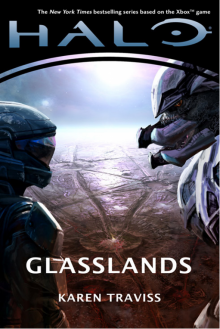 Halo: Glasslands
Halo: Glasslands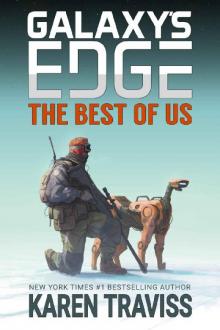 The Best of Us
The Best of Us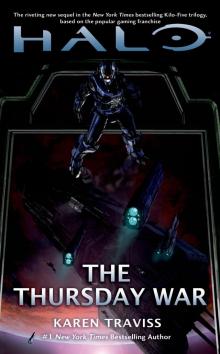 Halo: The Thursday War
Halo: The Thursday War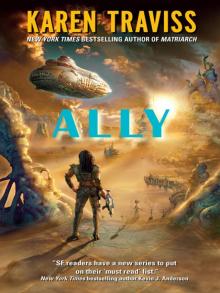 Ally
Ally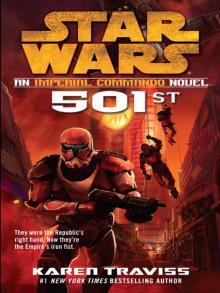 501st: An Imperial Commando Novel
501st: An Imperial Commando Novel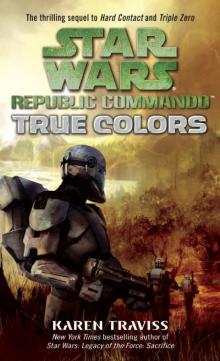 True Colors
True Colors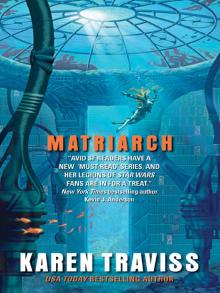 Matriarch
Matriarch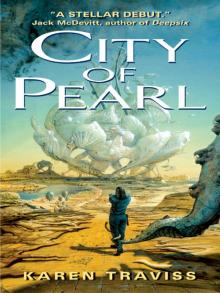 City of Pearl
City of Pearl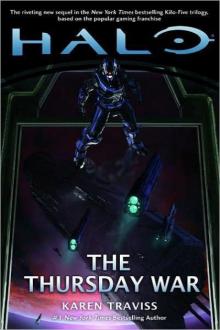 The Thursday War
The Thursday War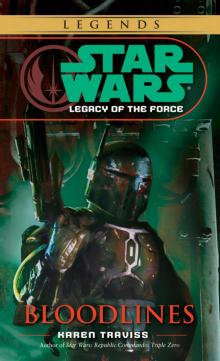 Bloodlines
Bloodlines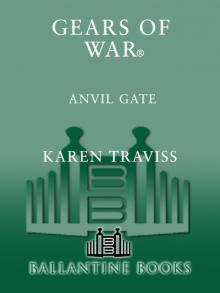 Gears of War: Anvil Gate
Gears of War: Anvil Gate Crossing the Line
Crossing the Line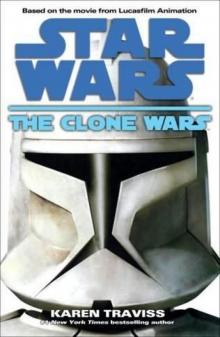 Star Wars - The Clone Wars 01
Star Wars - The Clone Wars 01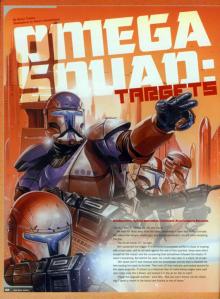 Omega Squad: Targets
Omega Squad: Targets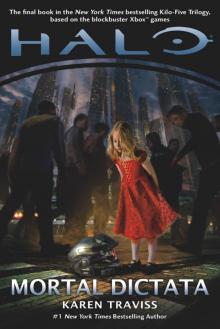 Halo®: Mortal Dictata
Halo®: Mortal Dictata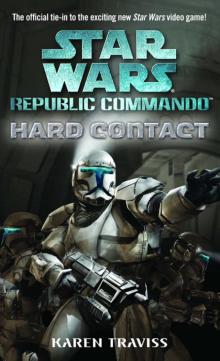 Hard Contact
Hard Contact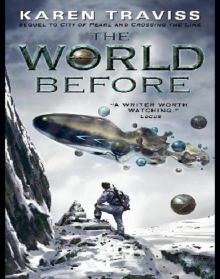 The World Before
The World Before Order 66
Order 66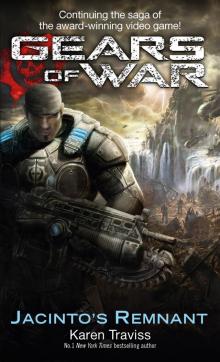 Gears of War: Jacinto's Remnant
Gears of War: Jacinto's Remnant Sacrifice
Sacrifice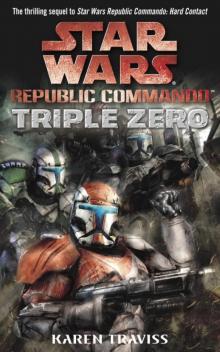 Triple Zero
Triple Zero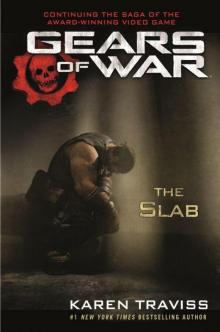 Gears of War: The Slab (Gears of War 5)
Gears of War: The Slab (Gears of War 5)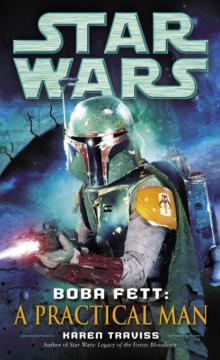 NEW JEDI ORDER: BOBA FETT: A PRACTICAL MAN
NEW JEDI ORDER: BOBA FETT: A PRACTICAL MAN Going Grey
Going Grey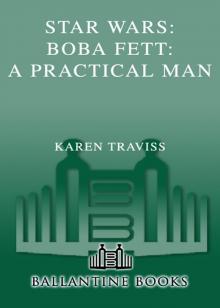 Star Wars: Boba Fett: A Practical Man
Star Wars: Boba Fett: A Practical Man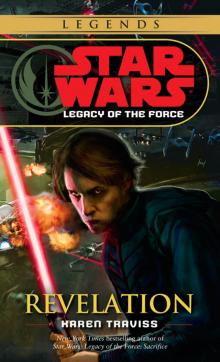 Revelation
Revelation Coalition's End
Coalition's End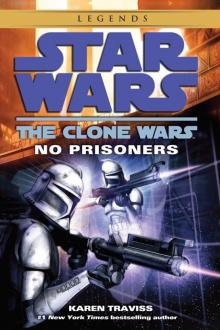 No Prisoners
No Prisoners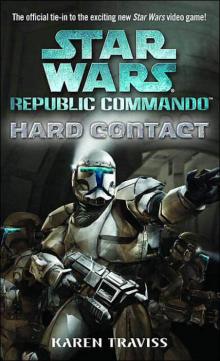 Star Wars Republic Commando: Hard Contact
Star Wars Republic Commando: Hard Contact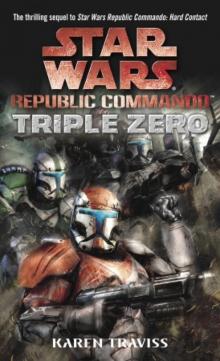 Star Wars: Republic Commando: Triple Zero rc-3
Star Wars: Republic Commando: Triple Zero rc-3 The Clone Wars
The Clone Wars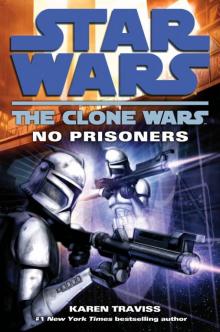 The Clone Wars: No Prisoners
The Clone Wars: No Prisoners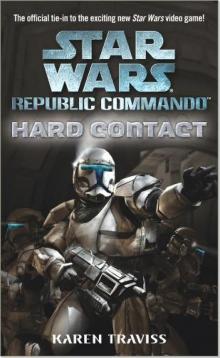 Star Wars: Republic Commando: Hard Contact rc-1
Star Wars: Republic Commando: Hard Contact rc-1 Judge
Judge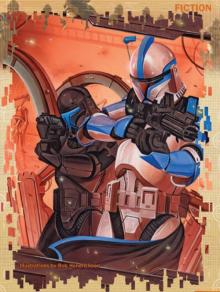 Omega Squad: Targets rc-4
Omega Squad: Targets rc-4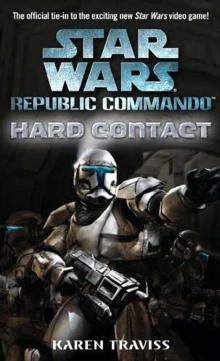 Star Wars - Republic Commando - Hard Contact
Star Wars - Republic Commando - Hard Contact